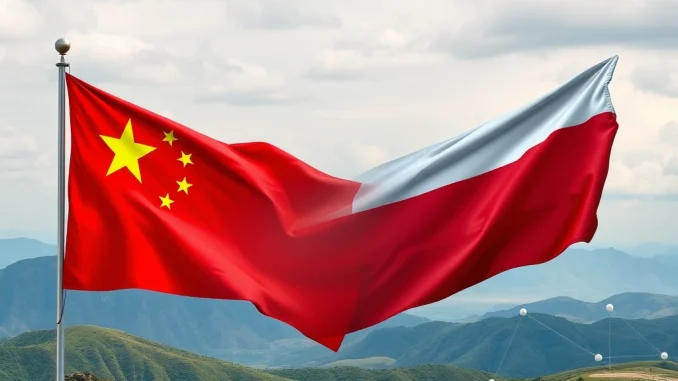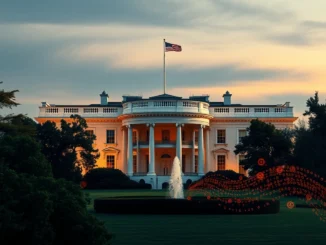
Global events often send ripples through financial markets, and the world of cryptocurrency is no exception. When major global powers like China and Russia hold high-level discussions, those in the crypto space pay close attention. Why? Because shifts in international relations, trade agreements, and financial strategies can directly or indirectly influence the landscape of digital assets, from the latest altcoin movements to the overall sentiment around the Bitcoin Price. Let’s delve into the recent China Russia Meeting and explore its potential connections to the ever-evolving world of Geopolitics Crypto.
What Happened at the China Russia Meeting?
According to reports, Chinese President Xi Jinping held small-group talks with Russian President Vladimir Putin at the Kremlin Palace in Moscow today (May 8). While the specific details of ‘small-group talks’ are often kept private, such meetings between leaders of nations with significant global influence typically cover a range of critical topics, including bilateral relations, economic cooperation, and international affairs.
These discussions occur within a complex global context, marked by shifting alliances and economic pressures. Understanding the broader geopolitical picture is key to appreciating how these interactions might touch upon digital finance and cryptocurrencies.
Geopolitics Crypto: How Global Politics Affect Digital Assets
The intersection of geopolitics and cryptocurrency is becoming increasingly relevant. Here’s why:
- Market Volatility: Geopolitical tensions or significant diplomatic events can increase market uncertainty, leading investors to seek safe havens or, conversely, exit riskier assets like cryptocurrencies.
- Regulatory Landscape: A country’s foreign policy or its relationship with other nations can influence its domestic stance on crypto regulation.
- Alternative Financial Systems: Geopolitical pressures, particularly the imposition of International Sanctions, can accelerate interest in using cryptocurrencies or central bank digital currencies (CBDCs) as alternatives to traditional payment networks like SWIFT, which are often tied to specific national interests.
- National Security Concerns: Governments may view crypto through a national security lens, considering its potential use in illicit finance or its role in capital flight.
Meetings like the one between President Xi and President Putin are data points that crypto market participants watch, trying to gauge potential future shifts in these areas.
Digital Yuan and the Push for De-dollarization
One area where China and Russia’s interests might converge is in exploring alternatives to the U.S. dollar for international trade. China has been actively developing and promoting its central bank digital currency, the Digital Yuan (e-CNY). Russia is also working on a digital ruble.
Could discussions between the two leaders touch upon using their respective digital currencies for bilateral trade? This is a possibility often speculated upon. Using CBDCs could potentially:
- Reduce reliance on the U.S. dollar and the associated financial infrastructure.
- Streamline cross-border payments between the two nations.
- Provide greater control and transparency for governments over international transactions (compared to decentralized crypto).
While the Digital Yuan is a centralized digital currency, distinct from decentralized cryptocurrencies like Bitcoin, its increased use in international trade could still impact the broader digital asset ecosystem by:
- Setting precedents for digital currency use in global commerce.
- Potentially diverting some capital flows away from traditional finance.
- Highlighting the growing interest in digital forms of value transfer on a global scale.
How Do International Sanctions Play a Role?
The landscape of International Sanctions has become a significant factor in global finance. Russia, in particular, faces extensive sanctions from Western nations. This has naturally led the country to explore ways to conduct international trade and finance outside the reach of these measures.
While using decentralized cryptocurrencies like Bitcoin for large-scale state-level transactions is fraught with challenges (volatility, transparency issues for large flows, infrastructure), the need to circumvent sanctions has certainly fueled interest in *any* alternative payment rails, including exploring possibilities with digital assets or developing state-controlled digital currencies like the digital ruble.
China, while not under the same level of broad sanctions as Russia, is also interested in increasing the international use of the Yuan and reducing its vulnerability to financial measures controlled by other nations. The development and potential internationalization of the Digital Yuan can be seen partly through this lens.
What Does This Mean for Bitcoin Price and Crypto Markets?
The direct impact of a single meeting on the Bitcoin Price is hard to isolate, as market movements are influenced by a multitude of factors. However, the underlying themes discussed in high-level geopolitical talks can contribute to the overall market narrative.
If the meeting signals closer economic ties between China and Russia, and a potential acceleration in their efforts to use alternative payment systems (like CBDCs or even exploring commodity-backed digital tokens), this could be interpreted in several ways by the crypto market:
- Positive for Bitcoin (Debatable): Some might see increased de-dollarization efforts as broadly positive for decentralized alternatives like Bitcoin, positioning it as a truly neutral, borderless asset outside of state control.
- Negative for Bitcoin (Also Debatable): Others might see state-led digital currency initiatives (like the Digital Yuan) as competition to decentralized crypto, potentially leading to stricter regulations or less adoption of assets like Bitcoin in major economies.
- Increased Volatility: Uncertainty surrounding the outcomes of such geopolitical shifts can simply add to market volatility as traders react to news and speculation.
Monitoring statements and potential agreements stemming from the China Russia Meeting is crucial for crypto enthusiasts and investors trying to understand the evolving global financial architecture and its potential influence on digital assets.
Actionable Insights for the Crypto Enthusiast
So, what should you take away from this?
- Stay Informed: Geopolitical events matter. Pay attention to news beyond just crypto-specific headlines.
- Understand the Nuances: Recognize the difference between decentralized cryptocurrencies (like Bitcoin) and centralized digital currencies (like the Digital Yuan). Their roles and implications in global finance are distinct.
- Consider the Macro Picture: Efforts related to International Sanctions and de-dollarization are long-term trends that could shape the future need for and adoption of various digital assets.
- Prepare for Volatility: Geopolitical uncertainty is often a driver of market swings.
In Summary
The recent China Russia Meeting between President Xi Jinping and President Vladimir Putin highlights the ongoing shifts in global geopolitics. While the immediate impact on the Bitcoin Price and wider crypto market may not be direct or easily measurable, the underlying themes of the discussion – including potential strategies for economic cooperation, responses to International Sanctions, and the future of global payments, possibly involving initiatives like the Digital Yuan – are highly relevant to the future of digital finance. As nations navigate complex international relations, the role of digital currencies and decentralized assets in the global economic order will continue to evolve, making geopolitical awareness an increasingly important part of understanding the crypto landscape.



